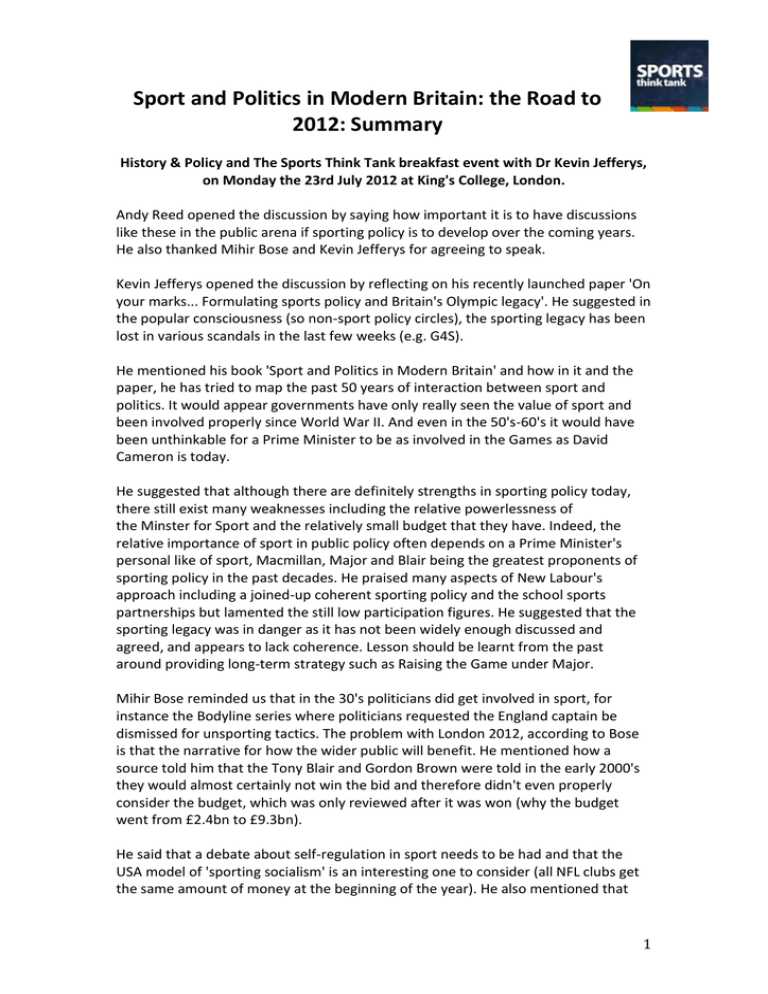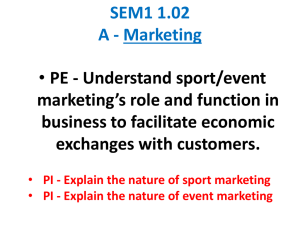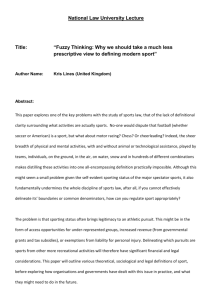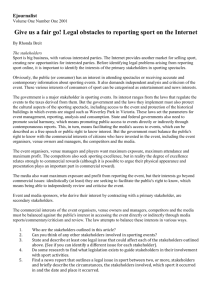Discussion Summary - Sports Think Tank
advertisement

Sport and Politics in Modern Britain: the Road to 2012: Summary History & Policy and The Sports Think Tank breakfast event with Dr Kevin Jefferys, on Monday the 23rd July 2012 at King's College, London. Andy Reed opened the discussion by saying how important it is to have discussions like these in the public arena if sporting policy is to develop over the coming years. He also thanked Mihir Bose and Kevin Jefferys for agreeing to speak. Kevin Jefferys opened the discussion by reflecting on his recently launched paper 'On your marks... Formulating sports policy and Britain's Olympic legacy'. He suggested in the popular consciousness (so non-sport policy circles), the sporting legacy has been lost in various scandals in the last few weeks (e.g. G4S). He mentioned his book 'Sport and Politics in Modern Britain' and how in it and the paper, he has tried to map the past 50 years of interaction between sport and politics. It would appear governments have only really seen the value of sport and been involved properly since World War II. And even in the 50's-60's it would have been unthinkable for a Prime Minister to be as involved in the Games as David Cameron is today. He suggested that although there are definitely strengths in sporting policy today, there still exist many weaknesses including the relative powerlessness of the Minster for Sport and the relatively small budget that they have. Indeed, the relative importance of sport in public policy often depends on a Prime Minister's personal like of sport, Macmillan, Major and Blair being the greatest proponents of sporting policy in the past decades. He praised many aspects of New Labour's approach including a joined-up coherent sporting policy and the school sports partnerships but lamented the still low participation figures. He suggested that the sporting legacy was in danger as it has not been widely enough discussed and agreed, and appears to lack coherence. Lesson should be learnt from the past around providing long-term strategy such as Raising the Game under Major. Mihir Bose reminded us that in the 30's politicians did get involved in sport, for instance the Bodyline series where politicians requested the England captain be dismissed for unsporting tactics. The problem with London 2012, according to Bose is that the narrative for how the wider public will benefit. He mentioned how a source told him that the Tony Blair and Gordon Brown were told in the early 2000's they would almost certainly not win the bid and therefore didn't even properly consider the budget, which was only reviewed after it was won (why the budget went from £2.4bn to £9.3bn). He said that a debate about self-regulation in sport needs to be had and that the USA model of 'sporting socialism' is an interesting one to consider (all NFL clubs get the same amount of money at the beginning of the year). He also mentioned that 1 school sport desperately needs looking at and the current approach does not seem to be working. Andy Reed then reflected on the distinction between elite vs community sport funding. Around £200m has been spent to gain x medals at the Games - has this been well spent? We need to have this debate too. Will it inspire more people to take part? It was then opened up to the floor for questions, and various different topics were discussed with some excellent questions and reflections from the audience, including: 'sport' people needing to speak a relevant language to those who do not speak in sport-speak; the lottery has been very positive for sport in the UK; the role of the Minister for Sport; the need for strategic leadership but for politicians not to meddle in the detail such as Free Swimming; that traditional clubs need to be less rigid and more flexible to fit in with modern life; engaging the 580 MPs who 'don't get sport' as opposed to the 20 who do; role of the media (who generally don't think sporting policy is that newsworthy); the very increasing gap between elite sports people and the public; the need for debate about elite and community funding; that NGBs are 19th century bodies delivering a 20th century policy in the 21st century; the detrimental gap between the arts and sports not necessarily true in other countries; the need for long–term strategy for sport not just short term reactions; and international comparisons. Kevin Jefferfys ended with the recommendations from his paper that an overarching statement of intent for sport was vital for the future of sporting policy as well as increased funding spent wisely. Sam Tomlin Sports Think Tank 2







